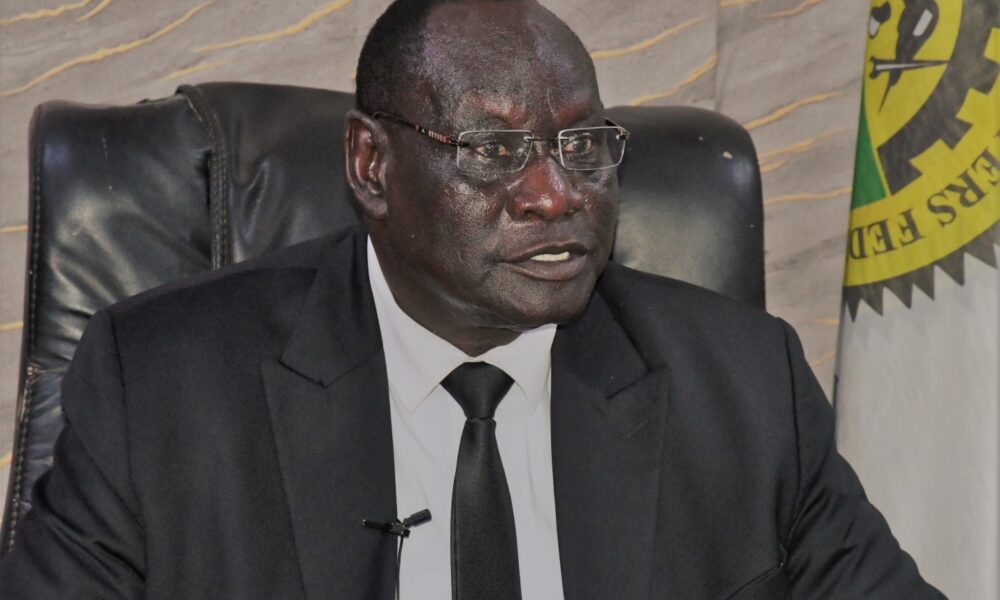By Bida Elly David
Following a recent drop in dollar rate against South Sudanese pound, the business community has directed all traders to lower commodity prices immediately or face measures.
Commodity prices in the market have drastically risen in the past two weeks as a result of the fluctuating foreign exchange market, which traders use as an excuse.
As a free market economy, it has almost become a culture in the country that whenever the dollar rate rises, traders increase market prices.
However, when the dollar rate reduces, prices remain stagnant, which provokes serious concerns among consumers.
Speaking to journalists yesterday, Ayii Duang Ayii, chairperson of the Business Community, challenges merchants against double pricing of goods.
He urges traders to follow the trends of market flow.
“Last week, the dollar rate shot up as $1 was exchanged at SSP 2,500, but this week, we as the business community have realized a greater decline in the foreign currency,” Ayii stated.
“In a resolution of a meeting that we had, all traders are therefore directed to reduce commodity prices with immediate effect,’’ he echoed.
A business community leader noted that the on-going inflation is because each trader wants to double profit, saying it negatively impacts the final consumer with little disposable income.
“They are supposed to act based on market fluctuation; the higher the dollar, the higher the price, but the dollar has lost weight and they are still increasing; this is wrong,’’ he exclaimed.
With the depreciation of the hard currency, Ayii highlighted that traders don’t have any genuine complaints about keeping prices intact.
He said serious measures will be taken with the help of the security forces against any trader who does not abide by the directives.
“We as the community are going to jointly work with the national and state chambers of commerce as well as the government; any trader found charging high prices on goods shall face security measures,’’ he warned.
According to Ayii, they shall have a market inspection in which traders will have to produce receipts and quotations of the prices from the buyers and decide accordingly what to do.
Furthermore, the chairperson of the business community demonstrated pity to South Sudan citizens over the derailing economy, saying that everything would be fixed.
On the other hand, Ayii also slammed the authorities for being reluctant over serious measures in the current situation.
“The government has given trust to mostly foreign traders, which is why they fix prices freely the way they like because local traders are less competitive in the market,’’ he noted.
He urged the authority to jointly work with the national private sector to evaluate the crisis and find amicable solutions.
“Imagine the lack of trust from the government in local traders; water is expensive, and assorted food items and medication are also expensive just because they are in foreign hands and they export dollars to their countries at the end of the trading period,’’ he said.
Not only that, the business tycoon advised the government to use the financial resources to boost agriculture, saying it was the only remedy to the economic catastrophe.
“Let them inject the oil money into agriculture; if it is done well, then local investors through the South Sudan Agriculture Bank will be able to get loans and produce for the country,’’ Ayii advised.
He noted that the tentative directive by the business community is just a measure to mitigate the crisis.
He concluded that the business community, in collaboration with the chambers of commerce, remains committed to stabilizing the market.
Meanwhile, Robert Pitia, the chairperson of the Central Equatoria State Chamber of Commerce, told the No. 1 Citizen Daily Newspaper that it is very easy to revive the country’s economy if the government prioritizes agriculture.
“People need good road infrastructure and peace; once these things are done, food will be produced and sold within, and imports will be reduced,’’ he said.
He advised the authorities to consider positive reforms in the tax system by considering a major institution responsible for collecting tariffs.
“The issue of double pricing came as a result of random and unnecessary tariffs collected by different sources from the merchants, thus leaving them in a dilemma,’’ Pitia added.
Last week, security forces waged a comprehensive operation against black market money dealers, making the hard currency lose its value against local pounds.




